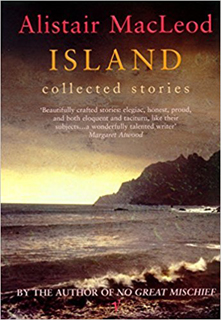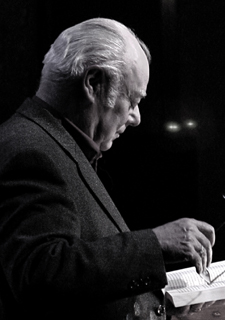
('Kidston Island Lighthouse' © Dennis Jarvis, 2017)
THE DARK AND DEEPENED VOICE WITHIN
by LAURA MORGAN
There’s a moment in Alistair MacLeod’s ‘The Vastness of the Dark’ when the young narrator, driving through a down-at-heel mining town, in a car with out of state licence plates, stares at the people on the street, who briefly look back at him, and he realises: ‘Their glances have summed me up and dismissed me as casually as that … “What can he know of our near-deaths and pain and who lies buried in our graves?”’ In Island: Collected Stories, MacLeod gives a voice to forgotten towns like this one, so that we can begin to understand their lives and struggles. The car, idling on a side street while passers-by look in, could also be an analogy for the reading of short stories. The narrator tells us:
For it is as if I am not part of their lives at all but am here only in a sort of movable red and glass showcase that has come for a while to their private anguish-ridden streets and will soon roll on and leave them the same as before my coming…
The story is here to alter our perspectives for a while, to make us think, but will soon disappear around a bend, tail lights fading in the dusk.
Island presents us with a community on the cusp of change. The population of MacLeod’s Cape Breton is dispersed in shanty towns by the ocean, on winding mountain roads, and in farms on steep headlands. But in the late twentieth century a new affluence encroaches on the old industries. Villas are built overlooking the sea. Tourists are buying up farmland. Only the loggers, who have long swapped their workhorses for heavy power equipment, are left: ‘For the first time in the centuries since the Scottish emigrations there is no human life at the end of this dark road,’ says the narrator of ‘The Road to Rankin’s Point’.
 MacLeod’s characters remember a time when lobster wasn’t a luxury but a staple of the local diet, a surplus of which might be used to fertilize fields, and claim in school ‘you could always identify the children of the poor because they were the ones with lobster in their sandwiches’. Where once canning factories strung the coast, now the lobster is packed in ice ‘and thundered by the gigantic transport trucks, day and night, through New Glasgow, Amherst, Saint John and Bangor’. At their journey’s end, the lobsters are ‘tossed still living into boiling pots’, this image, the last in the paragraph, suggesting something of the heartlessness with which old ways are tossed aside by consumerism.
MacLeod’s characters remember a time when lobster wasn’t a luxury but a staple of the local diet, a surplus of which might be used to fertilize fields, and claim in school ‘you could always identify the children of the poor because they were the ones with lobster in their sandwiches’. Where once canning factories strung the coast, now the lobster is packed in ice ‘and thundered by the gigantic transport trucks, day and night, through New Glasgow, Amherst, Saint John and Bangor’. At their journey’s end, the lobsters are ‘tossed still living into boiling pots’, this image, the last in the paragraph, suggesting something of the heartlessness with which old ways are tossed aside by consumerism.
Economic concerns are never far away. When a father drives his fist through a window in a moment of drunken anguish brought on by his looming unemployment, the son prays that no tendons are damaged, because ‘it was the only good hand that he had and all of us rode upon it as perilous passengers on an unpredictably violent sea’. In this way, the stories are representative of the community. This is most explicit in the use of the first person plural in ‘The Closing Down of Summer’ – a story where the perspective is that of a group of miners. Readers experience a collective mindset through the constancy of we, us, and our:
All summer we have watched our bodies change their colour and seen our hair grow bleached and ever lighter. Only the scars that all of us bear fail to respond to the healing power of the sun’s heat. They seem to stand out even more vividly now, long running pink welts that course down our inner forearms or jagged saw-toothed ridges on the taut calves of our legs.
MacLeod’s register is consistent throughout his work. It isn’t simply a matter of voice, because voice is capable of different moods; it is more that in capturing a society ‘poised on the edge of extinction’, as John McGahern puts it in the foreword to the 2002 edition, each story has the low, hushed tones of a eulogy. For MacLeod, death, or the threat of death, runs through everything.
In ‘The Road to Rankin’s Point’, a mountain road with blocked sluices causes the rear of a car to ‘slew to the right and hang above the four-hundred-foot drop that falls to the crashing surf’; whilst in ‘Second Spring’ parts of a clifftop road have crumbled, and we are told that once runaway horses had swung a wagon behind them, ‘lifting it off its wheels in the tightest turns and suspending it for seconds… above the darkened sea’. Dorothea Brande is critical of authors who return to stock images in their work, believing it indicates a lack of energy in the creative process, but this is a different kind of repetition, the sort that comes from an author’s obsession with capturing a certain truth. I can imagine MacLeod being in a car when the back wheels lost traction on a dangerous bend, and how he knew, even before the lurch in his stomach ebbed, that he had to communicate to others this experience so particular to dirt mountain roads.
MacLeod lived most of his life in Cape Breton. His own family were farmers and miners and his knowledge of place is intimate; for miners, scarred in various ways from small accidents, ‘it is damage to our feet that we fear the most’. He understands too the sacrifice migrant workers make, spending the majority of their lives apart from their families:
I have attended few parents’ nights or eighth-grade graduations or father-and-son hockey banquets, and broken tricycle wheels and dolls with crippled limbs have been mended by other hands than mine.
As a Gael, MacLeod comes from an oral tradition, so the culture of storytelling is in his blood. His predominantly first person narratives often spiral into yarns and myths. ‘Vision’, which contains so many stories within stories that we descend into its fiction as though down the shaft of a mine, has a wonderful scene where the twins Alex and Angus meet a strange woman, and the dialogue’s repeated utterances resemble those of a folktale, easy to remember and pass down:
“Oh,” she said. “How old are you?”
“Eleven,” they said. “Both of us. We’re twins.”
“Oh,” she said. “Both of you. I have relatives in Kintail. Come in.”
…
“Did you know these dogs were twins?” she asked.
“No,” they said. “We didn’t.”
“Well,” she said. “They are.”
 Some stories have intertextual relationships with traditional song. In ‘Vision’, a story about second sight, there is a retelling of the Brahan Seer legend, a clairvoyant who prophesised the future of the last of the Seaforth Mackenzies, claiming the four sons would predecease the father; MacLeod quotes from Sir Walter Scott’s ode ‘The Farewell to Mackenzie’: ‘What ’vails it the tale of thy sorrows to tell? / In the springtime of youth and of promise they fell!’ These lines resonate for the twins when Angus loses a limb in the Great War, and Alex his sight in World War II. In ‘The Lost Salt Gift of Blood’ MacLeod takes a Canadian ballad and alters the words in conversation with his own narrative. He closes his story about the miners, who have lost fathers and brothers in collapsed shafts, with lines from ‘I wend to death’, an anonymous fifteenth century verse, which ends, ‘Death is to man the final way – / I wend to be clad in clay’. The intertextuality, when encountered so often, becomes a signifier for how culture is transmitted: memory and story.
Some stories have intertextual relationships with traditional song. In ‘Vision’, a story about second sight, there is a retelling of the Brahan Seer legend, a clairvoyant who prophesised the future of the last of the Seaforth Mackenzies, claiming the four sons would predecease the father; MacLeod quotes from Sir Walter Scott’s ode ‘The Farewell to Mackenzie’: ‘What ’vails it the tale of thy sorrows to tell? / In the springtime of youth and of promise they fell!’ These lines resonate for the twins when Angus loses a limb in the Great War, and Alex his sight in World War II. In ‘The Lost Salt Gift of Blood’ MacLeod takes a Canadian ballad and alters the words in conversation with his own narrative. He closes his story about the miners, who have lost fathers and brothers in collapsed shafts, with lines from ‘I wend to death’, an anonymous fifteenth century verse, which ends, ‘Death is to man the final way – / I wend to be clad in clay’. The intertextuality, when encountered so often, becomes a signifier for how culture is transmitted: memory and story.
While his present-day characters are often university lecturers or lawyers, the stories have great respect for skilled labour. None more so than ‘The Closing Down of Summer’, where the miners take pride in the perfection of their measurements and calculations:
What we know through eye and ear and touch is of a finer quality than any information garnered by the most sophisticated of mining engineers with all their elaborate equipment.
In the sixties, my father worked as a welder in a shipyard, and I’ve heard stories of his labouring in confined, theoretically impossible spaces – hanging upside down, fumes clouding his seam. Island reminds us that practical expertise, refined by years of endeavour, deserves our respect as much as learning from books.
MacLeod’s style embraces many literary taboos. He is fond of pairings, even when this creates redundancy:
swollen and distended — caked and hardened — seize and hold — enclosed and boarded – dark and deepened — parched and waiting – nurse and butt — warm and brimming — broad and gentle
It didn’t take me long to find these examples: four occur on a single page. But this is part of his lyricism. The power in the prose is to be felt in its phrasing – in this case, the emphasis inherent to the pair. His pleonasm extends to the way he expresses possession too, but the poetry in ‘the thudding contact of the enclosed and boarded rink’ and ‘the narrow closeness of the shaft’s bottom’ disappears if rephrased as ‘the rink’s thudding’ or ‘the shaft’s narrowness’. All this provides the collection with a rhythm that is audible – consider the alternating stress of ‘the thudding contact’, ‘enclosed and boarded’, ‘the narrow closeness’; I think MacLeod is so much about rhythm that the spirit of the prose would be lost were an adjective removed or their order switched.
While much of the collection is spent looking back, realism balances nostalgia. ‘In the Fall’, a story where an aged workhorse slips and slides on the muddy ramp of the truck that has come to take him to the glue factory, ends with the owner going out in the rain to lead the horse, not back to the barn as we hoped, but forwards, into the truck: a man with four children can’t afford to feed an idle horse. No matter how painful the image of the muddy ramp, I could read that story a hundred times, because I want to feel again the truth in the ending.
Contemplating the uninformed judgements we make of strangers, the boy in the ‘glassed-in car’ in ‘The Vastness of the Dark’, says: ‘But one should at least be honest.’ This comes a little out of the blue, not easily assimilable within the passage; instead, it seems at that moment that MacLeod is speaking directly to the reader, encapsulating in one short sentence what is foremost in his mind when he writes. It’s easy to be sentimental about old industries, old traditions, but Island also reaches deep within, and it’s in the darkness of ‘our near-deaths and pain’ that MacLeod’s voice echoes most.
~

Laura Morgan’s short stories have been published in a number of magazines and anthologies, including The Moth, New Writing Scotland, and Taking Flight (Vietnam). As well as fiction, she writes reviews and essays, and has featured as a Scottish Review of Books’ Emerging Critic. In 2017, she won a Scottish Book Trust New Writer Award. She blogs creative non-fiction at aremoteview.wordpress.com .
Author Photograph ©Rob Mcdougall

